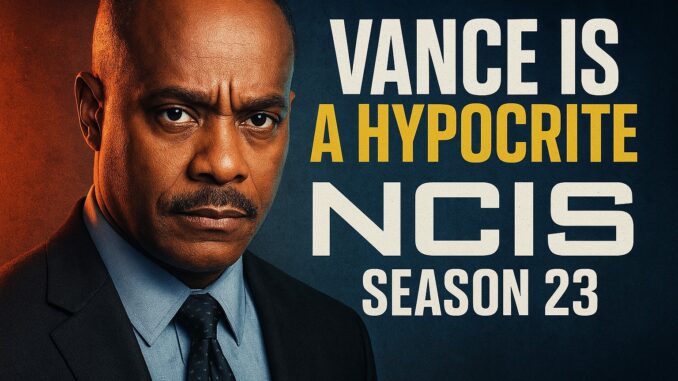
I listening to Alex warren and ignoring the fact that bobby nash is not apart of this season 9 teaserIn NCIS season 23, Leon Vance is a massive hypocrite, but his behavior is the key to saving the cop show’s future. It is not secret that the CBS series has been struggling in terms of maintaining its popularity. NCIS season 22 has its lowest-rated episode thus far, with its overall viewership dropping.
To be fair, NCIS is still one of the most watched shows on network television. So, the chances of it being canceled anytime soon are small. The NCIS franchise itself is thriving with a few spinoffs ongoing and expanding the universe. For the mothership, however, the upcoming year poses a big challenge to still be relevant.
A few storylines are already expected to go down in NCIS season 23, after they were set up in the last TV cycle. That said, arguably the biggest lingering narrative in the procedural is the fallout from the death of Alden Parker’s dad. Vance could help him bring the killer to justice quicker, but that won’t be the case.
Leon Vance’s Refusal To Help Parker Is Hypocritical Of Him. Per the new information about NCIS season 23, the rest of the Major Case Response Team (MCRT) will be fully onboard Parker’s plan to hunt down his father’s killer. However, the squad will find themselves at odds with Vance, who won’t be supportive of their actions according to showrunner Steven Binder (per TV Insider).
We’ve often played Director Vance telling his team they need to get back in the box, then he goes, wink, wink, nudge, nudge, and leaves the file on his desk while he leaves the office so they can look through something they need to. That’s not the case this time,” Binder does mention a mysterious reason why Vance is suddenly not backing his agents on solving the Parker Sr.’s murder mystery. Regardless of the reason, however, him changing his approach to personal cases makes him an insufferably hypocrite, because once, he was in a similar position as Parker.
13 years ago in NCIS season 10, episode 1, “Shabbat Shalom,” Vance wife, Jackie, was killed during the assasination of Eli David. Understandably, the NCIS Director was adamant about trying to find her killer. Having gone through that ordeal, Vance should be more understanding of Parker’s actions. At the very least, he should not be fully antagonistic of MCRT’s plan to get justice.
When you think of NCIS Season 23, you probably picture high-stakes investigations, shocking betrayals, and that signature blend of crime-solving and personal drama. But this season, all eyes are on Director Leon Vance. Fans are calling him out as a hypocrite—and honestly, they’re not wrong. Yet here’s the twist: that hypocrisy might be the very thing keeping NCIS alive after two decades on air. So, let’s dive deep into why Vance’s double standards, questionable decisions, and moral contradictions could actually be the masterstroke that secures the future of NCIS.
Who Is Leon Vance in NCIS?
Before we start throwing the “hypocrite” label around, let’s refresh our memory. Leon Vance, played by Rocky Carroll, has been with NCIS since Season 5. Rising through the ranks, he became the Director after Jenny Shepard’s death. Known for his stern leadership, strict discipline, and occasional soft spot for the team, Vance is both respected and feared.
But in Season 23, his leadership style has become a focal point—and not always in a good way.
The Hypocrisy Problem
So why do fans call him a hypocrite? It comes down to this: Vance holds his agents to impossible standards while bending the rules for himself.
-
He punishes agents for emotional decisions, yet he makes them constantly.
-
He insists on integrity but has a history of secret deals and compromises.
-
He criticizes favoritism yet clearly has “favorites” on the team.
Sound familiar? That’s classic TV leadership hypocrisy.
A Closer Look at Vance’s Double Standards
1. The “Do As I Say, Not As I Do” Leadership
Vance is quick to lecture his agents on professionalism. But when push comes to shove, he’s guilty of bending those very same rules. Fans haven’t forgotten his secret dealings with intelligence agencies or his shady political maneuvering.
2. Personal Bias in Professional Decisions
He often criticizes his agents for getting too close emotionally to cases. Yet, his personal losses—like the death of his wife—still shape his decisions today. It’s human, yes, but it also makes his leadership look inconsistent.
3. The Hypocrisy of Loyalty
Vance constantly demands loyalty from his agents. But when the higher-ups pressure him, he’s willing to sacrifice team members to protect his own position. Hypocritical? Absolutely.
Why Hypocrisy Works for the Storyline
Here’s the kicker: this hypocrisy isn’t lazy writing—it’s intentional character development. TV thrives on flawed leaders because they reflect the messy reality of leadership. If Vance were flawless, he’d be boring. His contradictions make him human, relatable, and frustrating in just the right way.
Conflict Drives NCIS Forward
Drama is the fuel of any long-running show. By making Vance the hypocritical authority figure, the writers create natural conflict. Every time he contradicts himself, it sparks tension between him and the team—and tension keeps viewers hooked.
Think about it: Gibbs was stoic, McGee is logical, Torres is impulsive, and Knight is empathetic. Add Vance’s hypocrisy to the mix, and you’ve got a perfect storm of clashes that drive the story forward.
Hypocrisy as a Survival Strategy
Let’s be real: NCIS has been running for over 20 years. For a show that old, survival means constantly reinventing itself. Vance’s hypocrisy offers the writers a goldmine of storylines:
-
Power struggles within the agency.
-
Ethical debates on justice vs. politics.
-
Betrayals and reconciliations.
By leaning into his contradictions, the show keeps things fresh and unpredictable.
Fan Backlash: Why Viewers Are Divided
Not everyone loves this direction, though. Many longtime fans are frustrated, saying Vance’s hypocrisy makes him untrustworthy or unlikeable. But here’s the thing—controversy fuels engagement. People don’t argue about characters they don’t care about. Vance’s hypocrisy has fans debating, theorizing, and tuning in just to see what he’ll do next.
The Realism of Hypocrisy in Leadership
Let’s step outside the TV world for a moment. In real life, leaders are rarely consistent. They balance politics, personal values, and public pressure. Hypocrisy isn’t just common—it’s inevitable. By portraying Vance this way, NCIS is tapping into something that feels uncomfortably real, and that keeps audiences invested.
The Future of NCIS Rests on Vance
Here’s where it gets interesting: NCIS can’t just rely on Gibbs nostalgia forever. With new characters taking the spotlight, the show needs a central figure that ties the old and new together. Vance, as a hypocritical yet enduring leader, fits that role perfectly. He bridges the past while shaping the future.
How Hypocrisy Can Lead to Redemption
What if the writers are building toward a redemption arc? Hypocrisy sets the stage for growth. Maybe Vance will be forced to face his flaws, own up to his mistakes, and prove why he deserves to lead. That kind of arc would not only save his character but also give the show a fresh emotional core.
Comparisons to Other TV Leaders
Think about other shows:
-
Breaking Bad’s Walter White was a hypocrite, but that’s what made him fascinating.
-
House M.D. constantly broke his own rules but was still loved.
-
Olivia Pope in Scandal was a fixer with endless contradictions.
Audiences don’t just accept hypocritical leaders—they crave them. Vance is NCIS’s version of this archetype.
The Moral Dilemma Keeps Us Watching
Every time Vance makes a hypocritical decision, viewers face a moral dilemma: do we agree with him or despise him? That push-and-pull keeps the fandom alive. In fact, it’s what makes NCIS feel less like a formulaic procedural and more like a living, breathing story.
Why Hypocrisy Saves NCIS’s Future
Without conflict, there’s no drama. Without drama, there’s no NCIS. Vance’s hypocrisy ensures the show has internal struggles to match its external cases. It keeps the stakes high and the conversations buzzing. Like it or not, that’s exactly what NCIS needs to survive Season 23 and beyond.

Conclusion
Vance may be a hypocrite, but he’s also the backbone of NCIS’s future. His contradictions create drama, his flaws drive storylines, and his leadership—however inconsistent—keeps the show evolving. In a series that’s lasted two decades, playing it safe would be a death sentence. By embracing Vance’s hypocrisy, NCIS ensures it still has fire left in the tank.
FAQs
1. Why do fans call Vance a hypocrite in NCIS Season 23?
Because he enforces strict rules on his agents but often bends those same rules for himself.
2. Does Vance’s hypocrisy hurt the show?
On the contrary, it adds depth and keeps the storylines engaging.
3. Could Vance’s hypocrisy lead to his downfall?
Possibly, but it could also set up a powerful redemption arc.
4. Is NCIS relying too much on Vance’s character?
Not at all—his role provides continuity while newer characters take center stage.
5. Will NCIS survive beyond Season 23?
If it continues to embrace complex characters like Vance, the future looks promising.